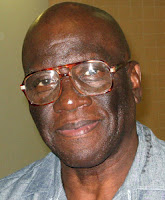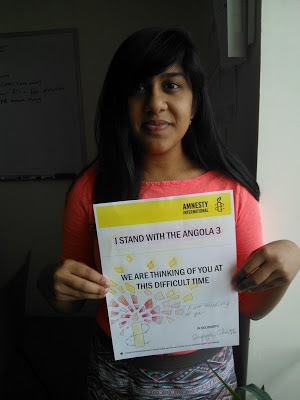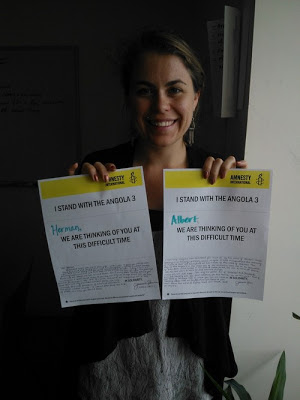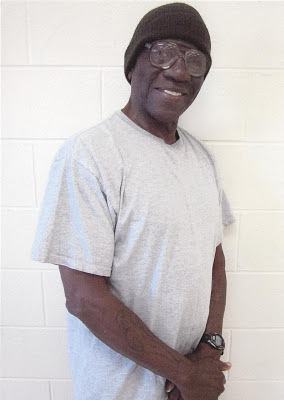 |
| (April 2013 photo of Herman Wallace) |
Angola 3’s Herman Wallace, Gravely Ill, Still Held in Isolation
By James Ridgeway and Jean Casella
(Reprinted with permission from Solitary Watch)
Herman Wallace, 71, has been diagnosed with liver cancer. He is being held in a locked prison hospital room at the Elayn Hunt Correctional Center at St. Gabriel, Louisiana. The prognosis is grave, according to persons with direct knowledge of the situation. Wallace is one of the two members of the Angola 3 who, along with Albert Woodfox, is still being held in solitary after more than 41 years.
Tessa Murphy, U.S. Campaigner for Amnesty International, which has taken up the case, said in an email, “The tens of thousands of Amnesty International supporters worldwide who have campaigned over the years for justice in Herman and Albert’s case will be devastated by this sad news. Herman and Albert have been held in cruel conditions of confinement for over 40 years without meaningful review; neither of the men have disciplinary record to indicate that they are a threat to themselves, fellow prisoners or staff, and the Louisiana prison authorities have since 1996 broken their own policy to justify the men’s continued detention under these conditions.’’
Wallace and Woodfox were placed in solitary confinement at the Louisiana State Penitentiary at Angola in 1972, following the murder of prison guard Brent Miller. The men believe they were originally targeted for the murder, and have been held in isolation ever since, because of their association with the Black Panther Party. (The third member of the Angola 3, Robert King, was freed in 2001 when his conviction for the murder of a fellow prisoner was overturned; he had spent 29 years in solitary.) Several years ago, the two men were transferred out of Angola and sent to separate, distant prisons, where they have remained in solitary.
Angola Warden Burl Cain has stated in a deposition that “Albert Woodfox and Herman Wallace is locked in time with that Black Panther revolutionary actions they were doing way back when.” For this reason, he says, they must remain in solitary, because if he released them to the general population “I would have me all kinds of problems, more than I could stand, and I would have the blacks chasing after them.” Louisiana Attorney General James “Buddy” Caldwell has likewise promised to keep Wallace and Woodfox behind bars. (Caldwell also claims they “have never been held in solitary confinement.”)
Both men have been fighting to have their convictions overturned by the federal courts, claiming they are based on highly questionable evidence. Woodfox’s conviction was overturnedfor the third time earlier this year, but he remains in prison while the state appeals. Wallace lost his latest challenge, but continues to fight in the courts. At the same time, a civil case has been filed challenging the men’s four decades of solitary confinement on First, Eighth, and Fourteenth Amendment grounds.
For 41 years, Wallace and Woodfox have spent at least 23 hours a day in cells measuring 6 feet by 9 feet. They are sometimes allowed out one hour a day to take a shower or a walk along the cellblock. Three days a week, they may use that hour to exercise alone in a fenced yard. In their civil suit, their lawyers argue that both have endured physical injury and “severe mental anguish and other psychological damage” from living most of their adult lives in lockdown. According to medical reports submitted to the court, the men suffer from arthritis, hypertension, and kidney failure, as well as memory impairment, insomnia, claustrophobia, anxiety, and depression. Even the psychologist brought in by the state confirmed these findings.
“The injustice of being held under such harsh, restrictive and inhumane conditions for over four decades is compounded by the serious legal concerns that have emerged in their cases over the years of litigation, Amnesty’s Murphy said. “Amnesty International will continue its fight for justice for Herman and Albert; with the terrible news of Herman’s health, this fight becomes more important than ever.”
Two months ago Wallace had complained of feeling ill. Prison doctors diagnosed his condition as a stomach fungus and put him on antibiotics. By last week, he had lost 45 pounds, and was sent to a local hospital, where he received the news that he has liver cancer. He was returned to prison after a few days.
A team of lawyers, an outside doctor who has taken care of Wallace for years, and a psychologist briefly visited Wallace last week in a prison hospital room. Wallace was not manacled or shackled. The door was locked. There is no television and little contact with the outside world. Telephone privileges which were made available in the beginning have been revoked by the prison. According to one source, a warden ordered visitors out after ten minutes. “The level of inhumanity I am not used to,” said Nick Trenticosta, one of Wallace’s attorneys in Louisiana. “I am used to bloodthirsty prosecutors who want to kill people, but not this sort of thing.”
For Albert Woodfox, 66, who lived in solitary nearby Wallace at Angola and still keeps in touch by letter, the news was shocking. According to his brother Michael Mable,who saw Albert over last weekend, his brother is depressed and “afraid of dying in this prison.” Mable was only able to see Woodfox through a glass partition, and Woodfox sat with his hands manacled and feet shackled while a captain and a lieutenant stood behind him, Mable said. Woodfox was strip searched, even though the interview was just a short ways from his cell. He is allowed one visit a month. Woodfox suffers from diabetes, high blood pressure, and hepatitis.
It is not yet clear what the next steps will be for Herman Wallace in terms of medical care. Because the prison medical record appears scant, doctors are anxious for Wallace to see an oncologist at an outside hospital. He may go there some time this week.
Asked whether the state would consider compassionate release or hospice care for Wallace, Pam Laborde, Communications Director for the Louisiana Department of Public Safety and Corrections, said, “As you hopefully understand, I am not in a position to discuss an offender’s medical condition due to privacy concerns.”
In a 2006 letter to Jackie Sumell, an artist with whom he is collaborating on a project called The House That Herman Built (now the subject of a documentary film), Herman Wallace wrote: “I’m often asked what did I come to prison for; and now that I think about it Jackie, it doesn’t matter. It doesn’t matter what I came here for, what matters now is what I leave with. And I can assure you, however I leave, I won’t leave nothing behind.”
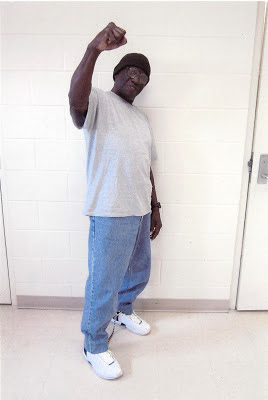 |
| (April 2013 photo of Herman) |



